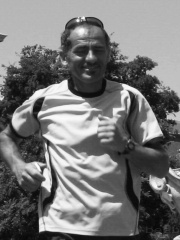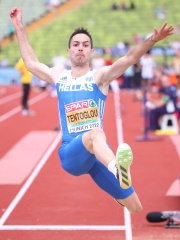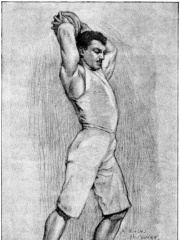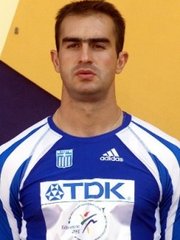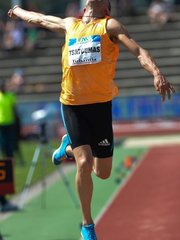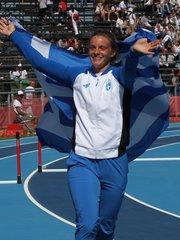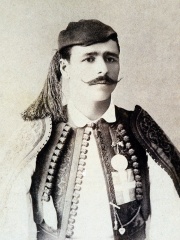

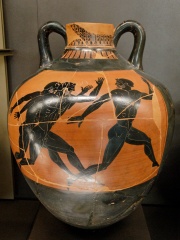
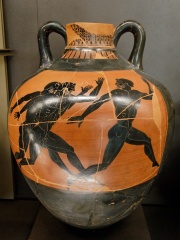
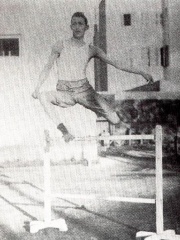
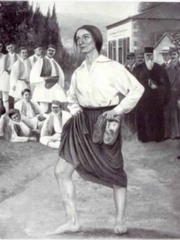
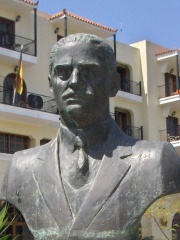

The Most Famous
ATHLETES from Greece
This page contains a list of the greatest Greek Athletes. The pantheon dataset contains 6,025 Athletes, 104 of which were born in Greece. This makes Greece the birth place of the 36th most number of Athletes behind Austria, and Kazakhstan.
Top 10
The following people are considered by Pantheon to be the top 10 most legendary Greek Athletes of all time. This list of famous Greek Athletes is sorted by HPI (Historical Popularity Index), a metric that aggregates information on a biography's online popularity. Visit the rankings page to view the entire list of Greek Athletes.

1. Spyridon Louis (1873 - 1940)
With an HPI of 71.13, Spyridon Louis is the most famous Greek Athlete. His biography has been translated into 44 different languages on wikipedia.
Spyridon Louis (Greek: Σπυρίδων Λούης [spiˈriðon ˈluis], sometimes transliterated Spiridon Loues; 12 January 1873 – 26 March 1940), commonly known as Spyros Louis (Σπύρος Λούης), was a Greek water carrier who won the first modern-day Olympic marathon at the 1896 Summer Olympics. Following his victory, he was celebrated as a national hero. A former soldier, Louis was encouraged to try out for the Olympics by his former commanding officer. After progressing through qualifying, he went on to win the inaugural Olympic marathon after placing first among seventeen competitors. Louis later became a police officer and a farmer. Outside of his athletics career, Louis was arrested for forgery, of which he was acquitted after spending a year in jail.

2. Georgios Roubanis (1929 - 2025)
With an HPI of 67.00, Georgios Roubanis is the 2nd most famous Greek Athlete. His biography has been translated into 29 different languages.
Georgios Roubanis (Greek: Γεωργιος Ρουμπανης; 15 August 1929 – 11 February 2025) was a Greek pole vaulter. He was born in Thessaloniki, Greece, and his family hails from Stemnitsa. He competed at three Olympic Games. He was the elder brother of Aristeidis. He was named the 1956 Greek Athlete of the Year. At the 1956 Melbourne Olympic Games, he won a bronze medal in the pole vault, as he scored 4.50 m (Greek record at the time), on 26 November 1956. In order to attend the Melbourne event, Roubanis lost a semester of his studies at UCLA in the United States. He abandoned athletics in 1961. After studying political economics, he got his master's degree in local self-government. He had worked in the U.S. for 5 years as a management consultant, for a movie company. He had also set up an advertising company and a printing plant. In sports, he served as the president of the Panhellenic Association of Calisthenics and founded several other associations. Roubanis died in Athens on 11 February 2025, at the age of 95.

3. Leonidas of Rhodes (200 BC - 200 BC)
With an HPI of 64.98, Leonidas of Rhodes is the 3rd most famous Greek Athlete. His biography has been translated into 20 different languages.
Leonidas of Rhodes (Ancient Greek: Λεωνίδας ὁ Ῥόδιος; born 188 BC) was one of the most famous ancient Olympic runners. For four consecutive Olympiads (164–152 BC), he was champion of three foot races. He was hailed with the title "Triastes" (tripler). Leonidas is acclaimed by some to be one of the greatest sprinters of all time.

4. Coroebus of Elis (800 BC - 800 BC)
With an HPI of 63.70, Coroebus of Elis is the 4th most famous Greek Athlete. His biography has been translated into 23 different languages.
Coroebus of Elis (Ancient Greek: Κόροιβος Ἠλεῖος, Kóroibos Ēleîos; Latin: Coroebus Eleus fl. c. 776 BC) was a Greek cook, baker, and athlete from Elis. He is remembered as the winner (ολυμπιονίκες, olympioníkes) of the first recorded Olympics, which consisted of a single footrace known as the stade or stadion. He is frequently described as having won the first Olympic Games, but Eusebius and other ancient writers stated that he was simply the first recorded winner, variously placing the first games in the Heroic Age, 27 olympiads before Coroebus, or 13 olympiads before. Coroebus being the earliest winner known to Hippias, his is still reckoned the "1st Olympiad"; following Hippias's dating, his victory is generally placed in the summer of the year 776 BC. The stadium at Olympia was one stade (600 Greek feet, 630.8 English feet, 192.27 m) long and the competition was still clothed in his time, naked competition beginning with Orsippus around 720 BC. For winning the race, Coroebus received an olive wreath and was later revered by the people of Elis, his grave still being known in the time of Pausanias.

5. Theagenes of Thasos (500 BC - 500 BC)
With an HPI of 61.96, Theagenes of Thasos is the 5th most famous Greek Athlete. His biography has been translated into 18 different languages.
Theagenes of Thasos (Greek: Θεαγένης ὁ Θάσιος) (typically spelled Theogenes (Greek: Θεογένης) before the first century AD) was an Olympian of ancient Greece, famous for his victories.

6. Alexandre Tuffère (1876 - 1958)
With an HPI of 60.81, Alexandre Tuffère is the 6th most famous Greek Athlete. His biography has been translated into 19 different languages.
Pierre Alexandre Tuffèri (Greek: Αλέξανδρος Τουφερής - Alexandros Touferis) (born 8 June 1876 in Athens – died 14 March 1958 in Athens), also spelt Tuffère, was a French-Greek athlete, although he was born and lived in Athens, his father was French. He competed at the 1896 Summer Olympics and the 1900 Summer Olympics for France, and the 1906 Intercalated Games for Greece. Following the refusal from the International Olympic Committee allowing him to represent Greece he entered the 1896 Summer Olympics representing France, his first event was the triple jump and after jumping 12.70 metres he finished in second place behind James Connolly of the United States and thus becoming the first French medallist. The next day Tuffère competed in the long jump but there is no record of the distance he jumped and it is just known he did not finish in the top four. Four years later, Tuffère competed in the 1900 Summer Olympics held in Paris, and again he was representing the French, he entered the triple jump and again there is no known distance he jumped but did finish in sixth place. Tuffère the competed in the 1906 Intercalated Games, this time representing Greece, where he entered the 110 metres hurdles. He finished fourth in his heat and did not qualify for the final. He also entered the standing long jump, finishing in seventh place out of 30 starters when he jumped 2.855 metres. In November 1940, Tuffère, who was living in Athens at the time, was nominated as the head of a gaullist group, organized by sympathizers of the Free French movement. However, the true leader of the group, initiated by general Georges Catroux who was in Cairo at the time, was Octave Merlier.

7. Stamata Revithi (1866 - 1896)
With an HPI of 60.78, Stamata Revithi is the 7th most famous Greek Athlete. Her biography has been translated into 21 different languages.
Stamata Revithi (Greek: Σταμάτα Ρεβίθη; 1866 – after 1896) was a Greek woman who ran the 40-kilometre marathon during the 1896 Summer Olympics. The Games excluded women from competition, but Revithi insisted that she be allowed to run. Revithi ran one day after the men had completed the official race, and although she finished the marathon in approximately 5 hours and 30 minutes and found witnesses to sign their names and verify the running time, she was not allowed to enter the Panathinaiko Stadium at the end of the race. She intended to present her documentation to the Hellenic Olympic Committee in the hopes that they would recognize her achievement, but it is not known whether she did so. No known record survives of Revithi's life after her run. According to contemporary sources, a second woman, "Melpomene", also ran the 1896 marathon race. There is debate among Olympic historians as to whether or not Revithi and Melpomene are the same person.

8. Dimitrios Golemis (1874 - 1941)
With an HPI of 59.89, Dimitrios Golemis is the 8th most famous Greek Athlete. His biography has been translated into 24 different languages.
Dimitrios (or Demetrius) P. Golemis (Greek: Δημήτριος Γολέμης; 15 November 1874– 9 January 1941) was a Greek athlete. He competed at the 1896 Summer Olympics in Athens.

9. Evangelos Damaskos (b. 1801)
With an HPI of 59.24, Evangelos Damaskos is the 9th most famous Greek Athlete. His biography has been translated into 24 different languages.
Evangelos Damaskos (Greek: Ευάγγελος Δαμάσκος) was a Greek pole vaulter. He was born in Acharnes, Athens, Greece. He competed at the 1896 Summer Olympics in Athens. Damaskos competed in the pole vault. He tied with fellow Greek Ioannis Theodoropoulos for third place in the event, with a height of 2.60 metres.
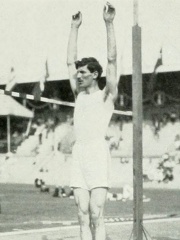
10. Konstantinos Tsiklitiras (1888 - 1913)
With an HPI of 58.37, Konstantinos Tsiklitiras is the 10th most famous Greek Athlete. His biography has been translated into 25 different languages.
Konstantinos "Kostis" Tsiklitiras (Greek: Κωνσταντίνος "Κωστής" Τσικλητήρας; 30 October 1888 – 10 February 1913) was a Greek athlete and Olympic champion. Born in Pylos, he moved to Athens in 1905 to study medicine. Tsiklitiras soon took up sports and joined Panellinios GS. He practised football with Panellinios and Panathinaikos (he was the first goalkeeper of Panathinaikos) and water polo, but is best remembered for winning four Olympic medals in standing long jump and standing high jump in the 1908 and 1912 Summer Olympics. He was Greek champion 19 times. His career stopped in 1913 when he volunteered to fight in the Balkan Wars. Although he could avoid conscription, he insisted on fighting for his country and fought at the Battle of Bizani. He contracted meningitis and died in Athens at the age of 24. His family home still exists in Pylos and holds a museum of his athletic achievements. There is a marble statue in front.
People
Pantheon has 104 people classified as Greek athletes born between 800 BC and 2002. Of these 104, 81 (77.88%) of them are still alive today. The most famous living Greek athletes include Yiannis Kouros, Nikolaos Kaklamanakis, and Konstantinos Kenteris. The most famous deceased Greek athletes include Spyridon Louis, Georgios Roubanis, and Leonidas of Rhodes. As of April 2024, 9 new Greek athletes have been added to Pantheon including Konstadinos Gatsioudis, Ekaterini Voggoli, and Thomas Bimis.
Living Greek Athletes
Go to all RankingsYiannis Kouros
1956 - Present
HPI: 57.66
Nikolaos Kaklamanakis
1968 - Present
HPI: 49.85
Konstantinos Kenteris
1973 - Present
HPI: 49.34
Ekaterini Thanou
1975 - Present
HPI: 46.73
Niki Bakoyianni
1968 - Present
HPI: 45.71
Hrysopiyi Devetzi
1976 - Present
HPI: 44.71
Katerina Stefanidi
1990 - Present
HPI: 44.61
Fani Chalkia
1979 - Present
HPI: 44.47
Miltiadis Tentoglou
1998 - Present
HPI: 44.20
Liu Xin
HPI: 43.94
Athanasia Tsoumeleka
1982 - Present
HPI: 42.64
Emmanouil Karalis
1999 - Present
HPI: 42.44
Deceased Greek Athletes
Go to all RankingsSpyridon Louis
1873 - 1940
HPI: 71.13
Georgios Roubanis
1929 - 2025
HPI: 67.00
Leonidas of Rhodes
200 BC - 200 BC
HPI: 64.98
Coroebus of Elis
800 BC - 800 BC
HPI: 63.70
Theagenes of Thasos
500 BC - 500 BC
HPI: 61.96
Alexandre Tuffère
1876 - 1958
HPI: 60.81
Stamata Revithi
1866 - 1896
HPI: 60.78
Dimitrios Golemis
1874 - 1941
HPI: 59.89
Evangelos Damaskos
1801 - Present
HPI: 59.24
Konstantinos Tsiklitiras
1888 - 1913
HPI: 58.37
Sotirios Versis
1876 - 1919
HPI: 58.12
Ioannis Theodoropoulos
1900 - Present
HPI: 57.75
Newly Added Greek Athletes (2025)
Go to all RankingsKonstadinos Gatsioudis
1973 - Present
HPI: 41.13
Ekaterini Voggoli
1970 - Present
HPI: 40.05
Thomas Bimis
1975 - Present
HPI: 39.24
Nikolaos Siranidis
1976 - Present
HPI: 38.48
Louis Tsatoumas
1982 - Present
HPI: 37.74
Vasileios Polymeros
1976 - Present
HPI: 36.39
Elina Tzengko
2002 - Present
HPI: 36.04
Dimitrios Chondrokoukis
1988 - Present
HPI: 32.31
Alastair Heathcote
1977 - Present
HPI: 31.33
Overlapping Lives
Which Athletes were alive at the same time? This visualization shows the lifespans of the 8 most globally memorable Athletes since 1700.

